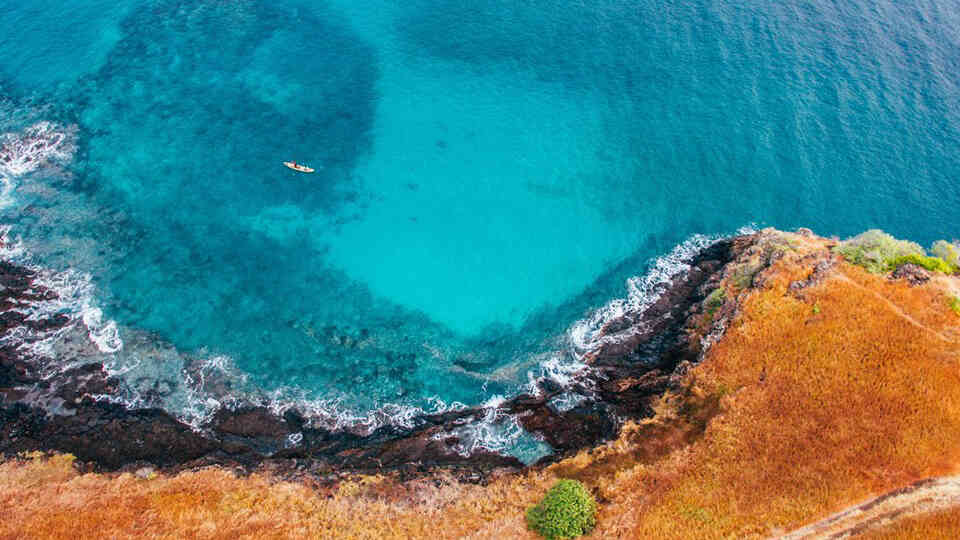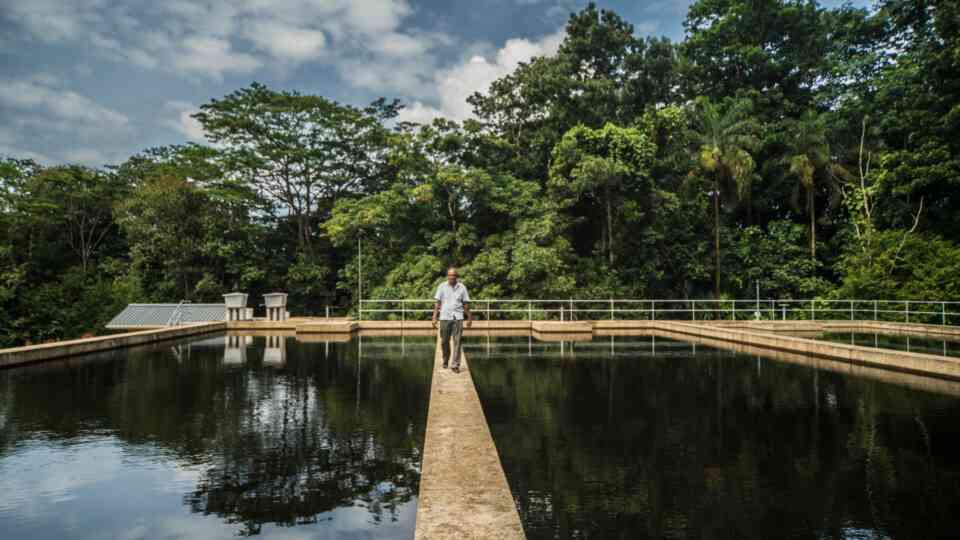The United Nations Office for Project Services (UNOPS)

Water, Environment and Climate
UNOPS Water, Environment and Climate (WEC) portfolio supports key climate initiatives and projects, and provides financial, grant and project management services on behalf of global funds and together with partners.
WEC supports partners' global climate commitments as well as regional and country-specific activities, focused on climate action, as well as protection and conservation of the environment.
This includes support for key multilateral environmental and climate agreements – such as the Paris Agreement and Cartagena Convention – and the Sustainable Development Goals.
WEC focuses its services on three key thematic areas: water resource management, environmental conservation, and climate action.
Key information
WEC ‘Action for Climate Targets’ (ACT)
WEC Action for Climate Targets (ACT) builds on WEC's extensive experience in addressing climate change to provide practical solutions and highly efficient and effective management approaches. It acts as a convener for key climate action initiatives, aiding in their successful implementation and proficient management.
NDC Partnership
UNOPS provides project management, fund management and implementation support for the NDC Partnership – a membership coalition of more than 200 countries to help countries achieve their nationally determined contributions (NDCs) aligned with the Paris Agreement, SDGs, and their individual development agendas.
Governments identify their NDC implementation priorities and the type of support that is needed to translate them into actionable policies and programs. The membership offers a tailored package of expertise, technical assistance and funding. This collaborative response provides developing countries with efficient access to a wide range of resources to adapt to, and mitigate the impacts of climate change, and foster more equitable and sustainable development.
This support is in partnership with the World Resources Institute and United Nations Framework Convention on Climate Change.
‘Initiative for Climate Action Transparency’ (ICAT)
UNOPS manages the Initiative for Climate Action Transparency (ICAT) which aims to provide policymakers around the world with tools and support to measure and assess the impacts of their climate actions. ICAT integrates guidance, capacity building and knowledge sharing, and currently engages 40 countries across four regions to foster transparent and effective climate action.
As a result of ICAT support:
Sri Lanka successfully developed and implemented a new national measurement, reporting and verification (MRV) system for the transport sector.
Ghana improved its existing MRV system with an appropriate climate data management system that supports regular national and international reporting of information on greenhouse gas emissions and climate actions.
Costa Rica optimized their legal architecture through strengthened data collection, management and sharing practices as well as established links between climate mitigation actions and sustainable development benefits.
Various partner countries have accessed additional climate finance and support thanks to generated evidence of the effectiveness of planned activities with regards to their national climate targets.
The ‘Climate Vulnerable Forum’ (CVF) and ‘Vulnerable Twenty’ (V20) Joint Multi-Donor Fund
UNOPS is the fund manager of the Climate Vulnerable Forum (CVF) and Vulnerable Twenty (V20) Joint Multi-Donor Fund. The fund's primary objective is to facilitate collaboration and strengthen the capacity of CVF and V20 member nations in advancing critical climate action priorities, such as mitigation, adaptation, and loss and damage. UNOPS is also responsible for the management and issuance of grants on behalf of the Fund. These grants aim to mobilize funds to help national governments and other partners overcome challenges in creating and implementing new climate frameworks.
‘Green Climate Fund’ (GCF)
The Green Climate Fund (GCF) is the world’s largest climate fund, mandated to support developing countries to accelerate transformative climate action through country-owned partnerships, flexible financing solutions and climate investment expertise.
UNOPS supports the GCF by providing grant management services to the Readiness and Preparatory Support Programme and Project Preparation Facility. UNOPS enhances access to GCF resources, to support the GCF mandate by working directly with national delivery partners to promote country ownership in responding to the challenges of climate change.
Since 2018 UNOPS has:
Provided grant management services to more than 134 grantees in 128 nations around the world.
Supported implementation of more than 245 GCF readiness grants by disbursing funds, monitoring project execution, and facilitating closure of grants in a timely and effective manner
Developed monitoring and tracking tools to inform GCF of the overall progress and capacity of delivery partners across the globe.
Offered financial management capacity assessments of delivery partners to support decision making processes.
‘The Climate and Clean Air Coalition’ (CCAC)
The Climate and Clean Air Coalition (CCAC) has developed a practical application framework that countries and regions can use to understand the climate and clean air consequences of their actions as well as their mitigation strategies.
The framework helps governments confidently integrate air quality and greenhouse gas mitigation policies and design harmonized policies that benefit people's lives today, while helping to make progress on global climate and development goals.
Since 2015 UNOPS has provided a range of operational support for the implementation and management of the initiative. This has facilitated the Coalition’s goal of catalyzing rapid reductions in short-lived climate pollutants to protect human health, agriculture and the environment.
Support to the ‘Global Environment Facility’ (GEF)
Through its Water, Environment and Climate portfolio, UNOPS works with Global Environment Facility (GEF) partners to carry out projects that cross international borders, specifically focusing on water-related issues.
Implementing the strategic action programme for the South China Sea and Gulf of Thailand
UNOPS manages the GEF project, ‘Implementing the strategic action programme for the South China Sea and Gulf of Thailand’, on behalf of UNEP. Working closely with the governments of Cambodia, China, Indonesia, Philippines, Thailand and Vietnam, the project aims to protect natural habitats, improve planning based on scientific knowledge, and encourage cooperation between countries in managing coastal areas.
Since 2008, each country involved has successfully created and acted on national action plans to deal with issues such as pollution. Reports from 2008 to 2021 show that these efforts have been making a positive difference. The reports also help identify areas that need more attention in the latest phase of the project.
Implementation of the strategic action programme of the Gulf of Mexico large marine ecosystem
UNOPS, manages the GEF project, ‘Implementation of the strategic action program of the Gulf of Mexico large marine ecosystem,’ on behalf of UNEP. Through this, UNOPS collaborates with governmental partners and environmental institutions in Mexico and the United States in the region of the Gulf of Mexico.
The project aims to improve how marine and coastal areas are managed across borders, involving key players from the region. The main goals include improving water quality, and conserving shared marine resources and fisheries, and protecting the overall health of the ecosystems in the Gulf of Mexico.
‘Protecting and restoring the ocean’s natural capital, building resilience and supporting region-wide investments for sustainable blue socio-economic development’ (PROCARIBE+)
UNOPS manages the GEF project, ‘Protecting and restoring the ocean’s natural capital, building resilience and supporting region-wide Investments for sustainable blue socio-economic development (PROCARIBE+)’ on behalf of UNDP.
Together with partners from the Caribbean and Brazil, the project aims to bring together various groups to collaborate on protecting, restoring and increasing the sustainability of marine and coastal areas in these regions. It also focuses on building economies that are both ocean-friendly and resilient.
This project builds on the results of two previous projects, the ‘Caribbean large marine ecosystem’ (CLME) and CLME+ that ran from 2009 to 2021. These past efforts set the stage for the next steps in regional cooperation and sustainable marine management.









